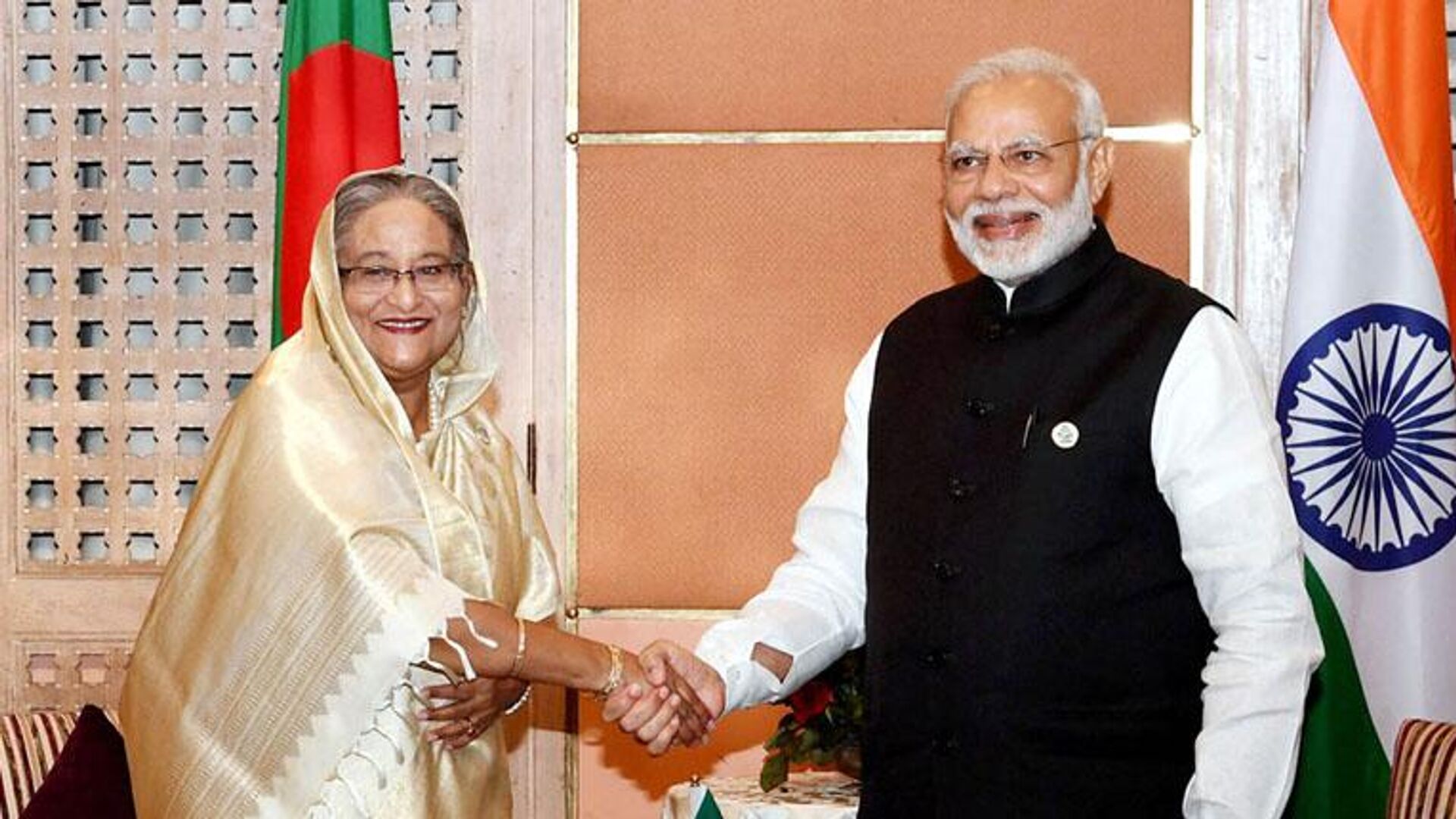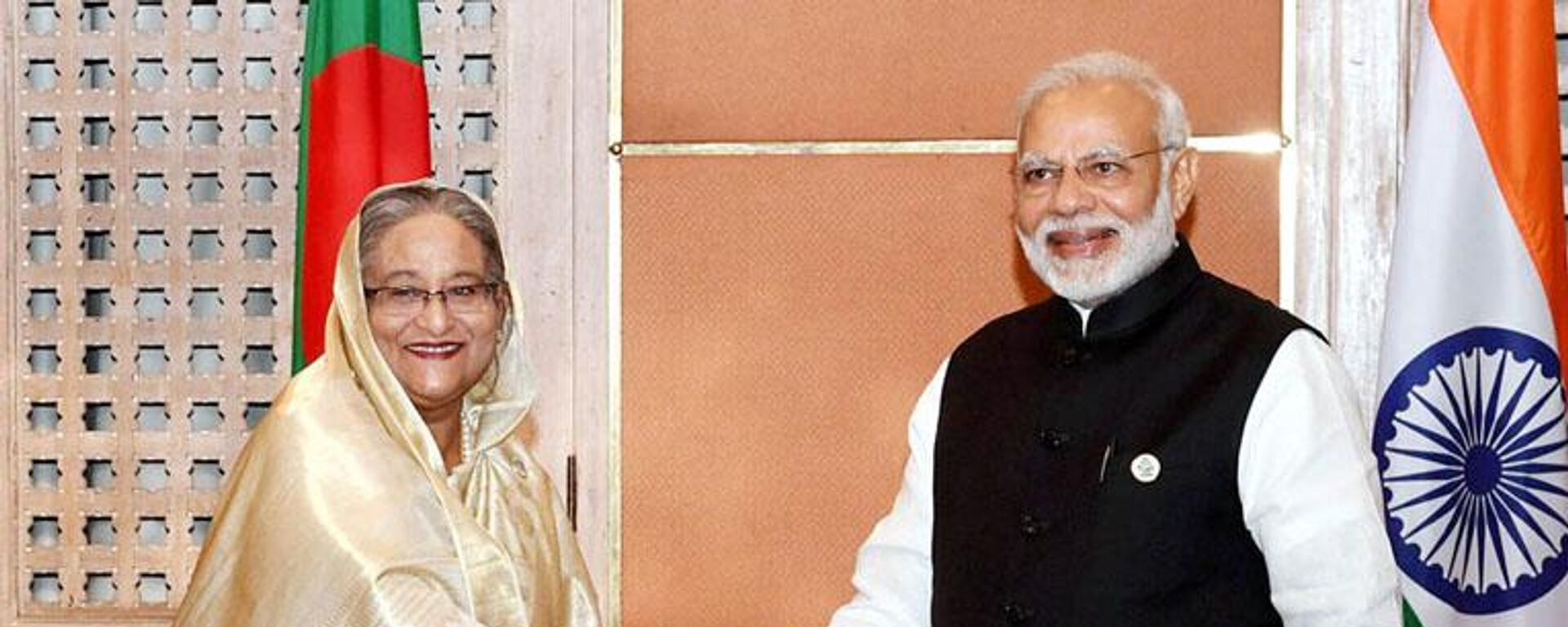https://sputniknews.in/20240806/western-interference-in-bangladesh-sparks-warning-sign-for-india-7968154.html
Western Interference in Bangladesh Sparks Warning Sign for India
Western Interference in Bangladesh Sparks Warning Sign for India
Sputnik India
Western and regional intelligence agencies have reportedly played a role in the unrest in Bangladesh, aiming to destabilize the region and obstruct India's... 06.08.2024, Sputnik India
2024-08-06T21:35+0530
2024-08-06T21:35+0530
2024-08-07T17:58+0530
sheikh hasina
s. jaishankar
india
bangladesh
pakistan
us state department
inter-services intelligence (isi)
taliban
government of india
ministry of external affairs (mea)
https://cdn1.img.sputniknews.in/img/07e8/07/03/7767733_0:0:764:430_1920x0_80_0_0_4404c61db34265e85bc07167f3260841.jpg
Unnamed official sources have informed Sputnik India that regional powers are seeking to destabilize India's borders given their strategic interests in the region.They are using proxies in Jammu and Manipur to force the Indian Army to “relocate many of its assets guarding eastern borders back to J&K.” Likewise, Washington seeks control of Chittagong port in Bangladesh, the sources stated. The CIA purportedly thinks it has the upper hand in creating a Christian enclave in the region with parts of Bangladesh, Myanmar, India and Chittagong as one of the two ports - the other being Sittwe in Myanmar, they explained. This 12 sq km area is called the Chin area, which the CIA tends to use as a missile launch pad.In a similar vein, the US wanted to throw out the Awami League from Bangladesh due to former PM Sheikh Hasina's refusal to permit any CIA presence, but India is standing rock solid as a bulwark, they stated.Their views were shared by Dr Suvrokamal Dutta, an international conversation political, economic and foreign policy expert.In the wake of Hasina's flight, US State Department spokesperson Matthew Miller stated that the United States stands with the people of Bangladesh and welcomes the announcement of an interim government, urging any transition to be conducted in accordance with Bangladesh’s laws.Meanwhile, Dutta highlighted that: “The situation appeared to involve a combination of agencies from the West, including the US and Europe, possibly wealthy individuals providing funding, along with support of regional states and its intelligence.”The pundit noted, “the significant involvement of Jamaat and the Bangladeshi Nationalist Party,” asserting that such a large-scale event would not have been possible without their internal support.However, if the Indian government had been more proactive, the situation might not have unfolded as it did, and the violence could have been better managed, Dutta believes.The pundit noted that, “the security of Bangladesh's significant minority population, comprising around 15 million Hindus, Buddhists, and Christians, is a major concern.”Restoring Peace and DemocracyRecent incidents in the suburban areas of Dhaka and other districts, including “the burning of temples, abduction of women, killings, and ransacking of homes, could worsen significantly if they continue to escalate,” Dutta affirmed.He also warned that a significant deterioration in the situation could trigger a large-scale refugee exodus from Bangladesh to India, which would impose a considerable economic, financial, and social burden on India due to their extensive shared border.However, Dutta expressed concern that “many of the interim government officials appointed by the Bangladesh army appear to have connections or ideologies aligned with the BNP, sectarian groups, and a possible sympathy towards Pakistan which is supported by the US.”This is troubling because “Pakistan has long sought Sheikh Hasina's removal and desired to advance its agenda of spreading terrorism in eastern and north-eastern India,” he contended.In the meantime, India's top priority is to ensure that elections are held in Bangladesh and to prevent the continuation of military or non-elected rule, Dr Smruti S Pattanaik, a research fellow at the MP-IDSA, told Sputnik India.Pattanaik stressed that, given the ongoing violence and over 300 casualties, it is vital for India’s interests that Bangladesh stabilises and returns to normalcy.West's Strategy to Impede India's Superpower AmbitionsMeanwhile, Dutta underscored that fueling regional instability, thus the West is seeking to impede India from becoming an even bigger player in the Indo-Pacific region.Pattanaik, in turn, mentioned the unstable situation in Manipur, which worsens Myanmar's conflict dynamics, and Sri Lanka's severe economic challenges have fuelled political unrest, that sparked a revolt and autonomous movement in the past.The expert alleged that Western and regional intel agencies might have been involved in Bangladeshi unrest, seeking to "destabilise the region to hinder India's economic and financial progress.”To avoid further deterioration of the situation, which could have serious consequences for India, the Modi government should act actively to support democracy in Bangladesh, Dutta highlighted.Dutta affirmed that “the turmoil in South Asia and the current foreign interference in Bangladesh should serve as a huge warning bell for India, emphasising the need for India to strengthen its stance and be more proactive in South and Southeast Asia.”Likewise, Pattanaik noted that while India is aware of Western powers' interference in Bangladesh, it should remain vigilant, continuing to closely monitor the situation, especially given the US' open support for military intervention.Dutta concluded that India must clearly assert its influence in the region, similar to how China and Russia have affirmed their positions, and should not tolerate interference or dictation from Western countries. “Brace for other domestic disturbances in the time to come. MSS assets in India are all activated to start domestic disturbances," according to official sources.
https://sputniknews.in/20240801/bangladesh-seeks-strong-indian-support-to-ward-off-western-pressure-7947218.html
india
bangladesh
pakistan
us
Sputnik India
feedback.hindi@sputniknews.com
+74956456601
MIA „Rossiya Segodnya“
2024
Swapna Nair
https://cdn1.img.sputniknews.in/img/07e7/09/12/4320104_0:0:681:681_100x100_80_0_0_ca8a7d4d582609272840ffdd1cde7278.jpg
Swapna Nair
https://cdn1.img.sputniknews.in/img/07e7/09/12/4320104_0:0:681:681_100x100_80_0_0_ca8a7d4d582609272840ffdd1cde7278.jpg
News
en_IN
Sputnik India
feedback.hindi@sputniknews.com
+74956456601
MIA „Rossiya Segodnya“
Sputnik India
feedback.hindi@sputniknews.com
+74956456601
MIA „Rossiya Segodnya“
Swapna Nair
https://cdn1.img.sputniknews.in/img/07e7/09/12/4320104_0:0:681:681_100x100_80_0_0_ca8a7d4d582609272840ffdd1cde7278.jpg
following her, resignation, prime minister of bangladesh, sheikh hasina, india, indian external affairs minister, s. jaishankar, minoritie, law and order, bangladesh, sheikh hasina's fall, western agencies, dr survokamal dutta, an international conversation political economic and foreign policy expert, us state department spokesperson, matthew miller, bangladesh, bangladesh’s laws, west, united states, europe, isi and pakistan, jamaat, bnp, indian government, kabul, taliban's takeover in kabul, hindus, buddhists, and christians, temples, abduction of women, killings, and ransacking of homes, refugee exodus, bangladesh, india, economic, financial, and social burden, india, bangladesh, bangladeshi army, military, non-elected rule, dr smruti s pattanaik, research fellow (ss) at the mp-idsa, bangladesh, bangladesh army, bnp, sectarian groups, us, sheikh hasina's, terrorism, eastern, north-eastern india, drug mafias, terrorists, the u.s. and europe, hawala to jamaat, indo-pacific, afghanistan, pakistan, nepal, the maldives, sri lanka, myanmar, and now bangladesh, manipur, myanmar's conflict dynamics, sri lanka, economic challenges, western and regional intel agencies, bangladeshi unrest, destabilize the region to hinder india's economic and financial progress, bangladesh, south asia, bangladesh, south and southeast asia, american, china, russia western countries
following her, resignation, prime minister of bangladesh, sheikh hasina, india, indian external affairs minister, s. jaishankar, minoritie, law and order, bangladesh, sheikh hasina's fall, western agencies, dr survokamal dutta, an international conversation political economic and foreign policy expert, us state department spokesperson, matthew miller, bangladesh, bangladesh’s laws, west, united states, europe, isi and pakistan, jamaat, bnp, indian government, kabul, taliban's takeover in kabul, hindus, buddhists, and christians, temples, abduction of women, killings, and ransacking of homes, refugee exodus, bangladesh, india, economic, financial, and social burden, india, bangladesh, bangladeshi army, military, non-elected rule, dr smruti s pattanaik, research fellow (ss) at the mp-idsa, bangladesh, bangladesh army, bnp, sectarian groups, us, sheikh hasina's, terrorism, eastern, north-eastern india, drug mafias, terrorists, the u.s. and europe, hawala to jamaat, indo-pacific, afghanistan, pakistan, nepal, the maldives, sri lanka, myanmar, and now bangladesh, manipur, myanmar's conflict dynamics, sri lanka, economic challenges, western and regional intel agencies, bangladeshi unrest, destabilize the region to hinder india's economic and financial progress, bangladesh, south asia, bangladesh, south and southeast asia, american, china, russia western countries
Unnamed official sources have informed Sputnik India that regional powers are seeking to destabilize India's borders given their strategic interests in the region.
They are using proxies in Jammu and Manipur to force the Indian Army to “relocate many of its assets guarding eastern borders back to J&K.”
Likewise, Washington seeks control of Chittagong port in Bangladesh, the sources stated. The CIA purportedly thinks it has the upper hand in creating a Christian enclave in the region with parts of Bangladesh, Myanmar, India and Chittagong as one of the two ports - the other being Sittwe in Myanmar, they explained. This 12 sq km area is called the Chin area, which the CIA tends to use as a missile launch pad.
In a similar vein, the US wanted to throw out the Awami League from Bangladesh due to former PM Sheikh Hasina's refusal to permit any CIA presence, but India is standing rock solid as a bulwark, they stated.
Their views were shared by Dr Suvrokamal Dutta, an international conversation political, economic and foreign policy expert.
“The internal turmoil in Bangladesh and Sheikh Hasina's fall were attributed to Western agencies who were funding the movement”, Dutta told Sputnik India.
In the wake of Hasina's flight, US State Department spokesperson Matthew Miller stated that the United States stands with the people of Bangladesh and welcomes the announcement of an interim government, urging any transition to be conducted in accordance with Bangladesh’s laws.
Meanwhile, Dutta highlighted that: “The situation appeared to involve a combination of agencies from the West, including the US and Europe, possibly wealthy individuals providing funding, along with support of regional states and its intelligence.”
The pundit noted, “the significant involvement of Jamaat and the Bangladeshi Nationalist Party,” asserting that such a large-scale event would not have been possible without their internal support.
However, if the Indian government had been more proactive, the situation might not have unfolded as it did, and the violence could have been better managed, Dutta believes.
Dhaka's situation differs significantly from that of Afghanistan, he emphasized, arguing that "unlike the complete neutrality India adopted towards the Taliban's takeover in Kabul, Dhaka has strong internal connections with India due to familial and social ties across the border."
The pundit noted that, “the security of Bangladesh's significant minority population, comprising around 15 million Hindus, Buddhists, and Christians, is a major concern.”
Restoring Peace and Democracy
Recent incidents in the suburban areas of Dhaka and other districts, including “the burning of temples, abduction of women, killings, and ransacking of homes, could worsen significantly if they continue to escalate,” Dutta affirmed.
He also warned that a
significant deterioration in the situation could trigger a large-scale refugee exodus from Bangladesh to India, which would impose a considerable economic, financial, and social burden on India due to their extensive shared border.
It is in “India's interest to be highly proactive, maintaining close contact with both the caretaker government in Bangladesh and the country's army to prevent the situation from spiralling out of control,” he asserted.
However, Dutta expressed concern that “many of the interim government officials appointed by the Bangladesh army appear to have connections or ideologies aligned with the BNP, sectarian groups, and a possible sympathy towards Pakistan which is supported by the US.”
This is troubling because “Pakistan has long sought Sheikh Hasina's removal and desired to advance its agenda of spreading terrorism in eastern and north-eastern India,” he contended.
In the meantime, India's top priority is to ensure that elections are held in Bangladesh and to prevent the continuation of military or non-elected rule, Dr Smruti S Pattanaik, a research fellow at the MP-IDSA, told Sputnik India.
Pattanaik stressed that, given the ongoing violence and over 300 casualties, it is vital for India’s interests that
Bangladesh stabilises and returns to normalcy.West's Strategy to Impede India's Superpower Ambitions
Meanwhile, Dutta underscored that fueling regional instability, thus the West is seeking to impede India from becoming an even bigger player in the Indo-Pacific region.
“The West appears to aim to prevent India from becoming a superpower by creating problems in its neighbouring regions, including Afghanistan, Pakistan, Nepal, the Maldives, Sri Lanka, Myanmar, and now Bangladesh,” he asserted.
Pattanaik, in turn, mentioned the unstable situation in Manipur, which worsens Myanmar's conflict dynamics, and Sri Lanka's severe economic challenges have fuelled political unrest, that sparked a revolt and autonomous movement in the past.
The expert alleged that
Western and regional intel agencies might have been involved in Bangladeshi unrest, seeking to "destabilise the region to hinder India's economic and financial progress.”
To avoid further deterioration of the situation, which could have serious consequences for India, the Modi government should act actively to support democracy in Bangladesh, Dutta highlighted.
The urgent priority is to “utilize back-channels to restore peace and stability in Bangladesh and ensure that the incoming government is robust enough to uphold democracy, preventing the country from devolving into a sectarian state, which would have significant repercussions for India,” he advised.
Dutta affirmed that “the turmoil in South Asia and the current
foreign interference in Bangladesh should serve as a huge warning bell for India, emphasising the need for India to strengthen its stance and be more proactive in South and Southeast Asia.”
Likewise, Pattanaik noted that while India is aware of Western powers' interference in Bangladesh, it should remain vigilant, continuing to closely monitor the situation, especially given the US' open support for military intervention.
Dutta concluded that India must clearly assert its influence in the region, similar to how China and Russia have affirmed their positions, and should not tolerate interference or
dictation from Western countries. “Brace for other domestic disturbances in the time to come. MSS assets in India are all activated to start domestic disturbances," according to official sources.



